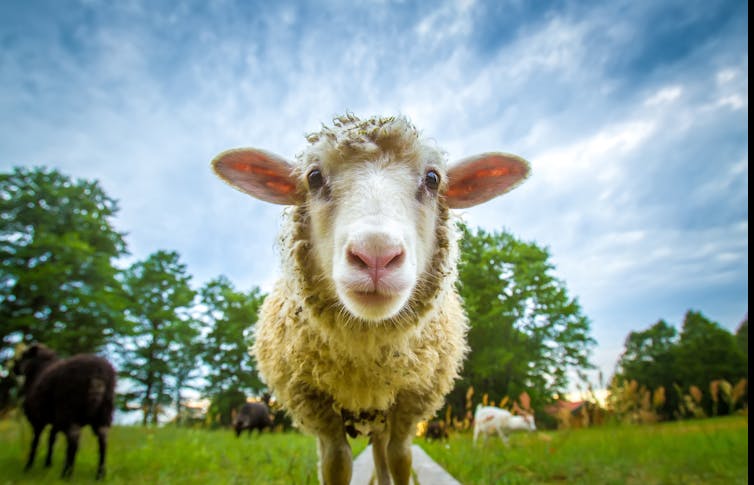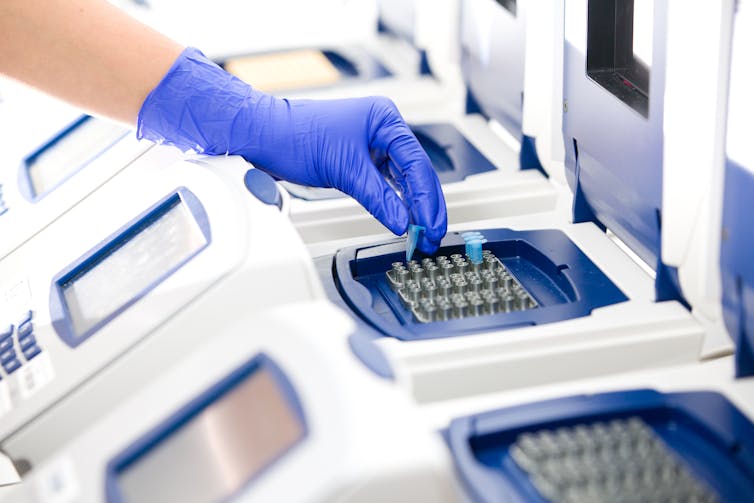
Image – Fotogrin, Shutterstock.
SARS-CoV-2, the virus that causes COVID-19, works by infecting the respiratory system. If it gets into the lungs, it causes an immune reaction, which can lead to pneumonia and even death. At the University of Dundee, we have identified 28 proteins created by SARS-CoV-2 that produce an immune response in the body. These proteins are vital research tools for developing diagnostics and in helping to understand how the virus infects and attacks us.
Viruses are encoded by genetic information called RNA, which serves as a blueprint for how they are put together. The “program” contains information on how to replicate and how to infect and attack their host. As scientists, we can learn this genetic code and use it to fight the virus.
The first step is to take the genetic sequence of the virus, convert it to DNA (a double strand, rather than a single strand) and then copy it using a technique known as the polymerase chain reaction (PCR). The process amplifies the genetic material many millions of times. This sequence is then used to program bacteria to make the proteins that make up the virus, enabling scientists to harvest and prepare them in large amounts.

Amplifying DNA with a PCR machine. Image – Vit Kovalcik, Shutterstock
These proteins will then be introduced into sheep on a local farm. The sheep then start to produce antibodies against the viral proteins and these can be harvested from the sheep every few weeks. The sheep enjoy a long and happy life in the fields on the farm and are not troubled greatly by the process. The antibodies are then brought back to the laboratories in Dundee and prepared for their various uses. The final product will be sent to labs around the world to be used in the fight against COVID-19.
There are around 20 researchers involved in the work. Each researcher is specialised in the particular process used in the antibody production process, from the molecular biologists cloning of the genetic sequence, protein scientists to manufacture the components, farm workers taking care of our sheep and technicians preparing the antibodies when harvested from the sheep.
Lock and key
The antibodies that the sheep produce can be used to develop diagnostic tests. These antibodies bind very tightly to the viral proteins and do not recognise other proteins, such as the ones in our bodies. It can be thought of a little like the key to your front door. There are millions of keys but only one will fit perfectly to the lock in your door and open it.
In the case of these antibodies, each antibody will only fit the viral protein it was designed for. This makes antibodies useful in identifying each part of the virus, as well as the complete virus, and understanding how it infects us and the best way of defeating it.
One application, for example, will be a technique that can rapidly identify the presence of the virus. This type of test can be used to determine whether the virus is present in a sample, such as a blood sample. The antibodies can be stuck onto a plate and the sample run over the plate. The antibodies will recognise the virus and pull it out of the sample.
A second antibody to the virus that has a fluorescent marker is then run over the plate and the plate is washed. If the virus is present, the plate will glow.
Understanding the novel coronavirus
Perhaps the most important use for these tools will be in understanding the basic biology of the virus and to identify ways to defeat it. For this, the antibodies will be used to capture the virus from model systems, such as human cell cultures as well as visualise it with imaging methods, such as western blotting (visualising proteins separated in a gel) or cell sorting (such as separating virus-carrying cells from healthy ones).
Certain parts of the virus are believed to be very important in the processes by which it infects us or attacks our lungs. Being able to capture and study these parts of the virus by having antibodies that specifically capture and identify them will enable us to understand this much more rapidly.
We will make these antibodies available to researchers across the globe to help the effort against COVID-19.![]()
Paul Davies, medical research council unit manager, University of Dundee
This article is republished from The Conversation under a Creative Commons license.

HAVE YOUR SAY